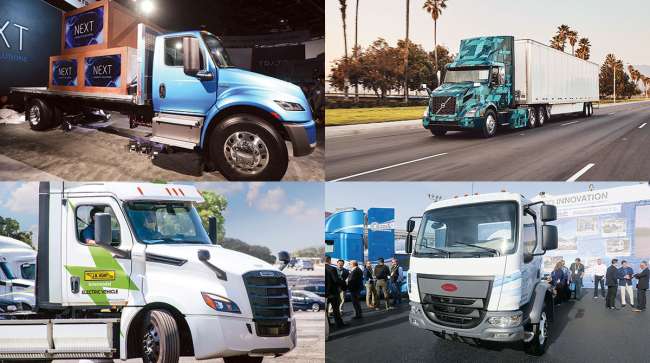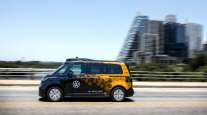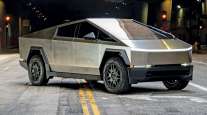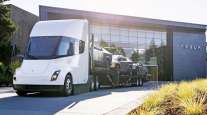Managing Editor, Features and Multimedia
Trucking Takes Initial Steps Toward a Zero-Emission Future

[Stay on top of transportation news: Get TTNews in your inbox.]
Diesel has long reigned as commercial trucking’s primary fuel, due in large part to its abundant availability, widespread fueling infrastructure and reliance on mature technology.
Today, there’s no question that diesel is king, but it is becoming clearer with each passing year that electric is the heir apparent.
Although significant hurdles remain, recent advances in electric-vehicle technology and the broader movement to reduce carbon emissions are creating market conditions that are increasingly favorable for electrification.
In 2020, truck manufacturers and their key suppliers continued to expand testing and development of battery-electric models and componentry, with many also investing in complementary hydrogen fuel cell technology.
And fleet customers are beginning to line up.
Some major corporations have pledged to adopt electric vehicles in the years and decades ahead as part of their sustainability goals.
Meanwhile, a growing number of trucking companies have begun piloting small numbers of electric trucks in their operations. These vehicles have been moving freight while also logging miles that will help fleets and manufacturers alike build knowledge and pave the way for broad deployment.
At the same time, government incentives and new regulation, particularly in California, are playing a significant role in jump-starting this new segment of the commercial vehicle market.
Together, these developments make it increasingly likely that the future of trucking will be powered by electric vehicles.
“All of the arrows are pointing in the same direction,” said Glen Kedzie, energy and environmental affairs counsel at American Trucking Associations. “The only thing we’re lacking right now is how to overcome the different barriers.”
Those challenges include the higher upfront cost of electric trucks, limitations on vehicle range and payload capacity, validating how these vehicles perform in real-world fleet applications and building out the charging infrastructure.
Major Fleets Commit to Electric Vehicles
Several major companies with large fleet operations have announced bold plans to roll out electric vehicles as a key element of reaching their corporate sustainability targets.
Walmart, the world’s largest retailer, announced in September that it intends to electrify all of its vehicles, including longhaul trucks, by 2040 on its journey toward its stated goal of achieving zero emissions within its global operations.
“These goals are ambitious, and we will need innovation and infrastructure to get there,” CEO Doug McMillon said in a statement.
With a fleet of 7,400 tractors, Walmart ranks No. 3 on the Transport Topics Top 100 list of the largest private carriers in North America.
In alignment with the corporation’s global sustainability goal, Walmart’s Canadian division announced it was tripling its reservations of the battery-electric Tesla Semi to a total of 130 trucks.
Walmart Canada also said it has committed to converting 20% of its fleet to electric power by the end of 2022 and aims to power its fleet using 100% alternative energy by 2028.
“[We] are putting safety, innovation and sustainability at the forefront of our logistics network,” John Bayliss, senior vice president of logistics and supply chain at Walmart Canada, said in a statement.

Amazon plans to deploy 100,000 fully electric delivery vans by 2030 in partnership with vehicle manufacturer Rivian. (Amazon.com)
As part of its own sustainability pledge, e-commerce giant Amazon.com Inc. has ordered 100,000 fully electric delivery vans from Rivian, a zero-emission vehicle manufacturer based in Plymouth, Mich.
The first of these customized vehicles will begin making deliveries to Amazon customers in 2021, the company said.
Amazon plans to have 10,000 of the electric vans operating in the United States and Europe by early 2022 and expects all 100,000 to be on the road by 2030.
“We hope our custom electric vehicle helps create a sense of urgency in the industry to think big about embracing sustainable technology and solutions — whether you’re a package delivery company, a logistics company, an ice cream manufacturer, or almost anyone else with vehicles on the road,” Ross Rachey, director of Amazon’s global fleet and products, said in an October statement.
Electric Trucks Hit the Road
A growing number of major trucking and transportation companies have begun testing electric vehicles.
Fleets such as NFI Industries, Penske Truck Leasing and Dependable Highway Express have been among the first to deploy heavy-duty electric trucks in their operations, and an expanding list of trucking companies has been joining them.
Knight-Swift Transportation Holdings has deployed its first battery-electric vehicle, a Freightliner eCascadia tractor, in the Los Angeles area.
The truckload carrier also announced in September that it has set a goal to cut its carbon emissions in half by 2035.
“While we have made significant strides in improving our environmental footprint over the years, we believe that setting an ambitious public goal to reduce carbon emissions generated by our fleet by 50% over the next 15 years quantifies our commitment,” Knight-Swift CEO Dave Jackson said in the statement.
The fleet said it intends to achieve that goal with a range of tractor and trailer technologies, including battery-electric and hydrogen fuel cell trucks, along with cleaner diesel vehicles.
“While we will likely have to take some risk, we believe that being environmentally responsible and being profitable are not mutually exclusive,” said Dave Williams, Knight-Swift’s senior vice president of equipment and government relations. “We expect these technologies to reduce emissions and to be cost-effective.”
Knight-Swift, based in Phoenix, ranks No. 7 on the Transport Topics Top 100 list of the largest for-hire carriers in North America.
Regulators Push for Electrification
A regulatory framework for electric-powered trucks has begun to emerge, primarily at the state level.
In June, California’s Air Resources Board approved the state’s Advanced Clean Trucks regulation, which mandates that 5% of all Classes 7-8 tractors sold be zero-emission vehicles starting in 2024. That percentage increases with each new model year, rising to 40% by 2032. The rule also includes rising zero-emission sales mandates for light-duty commercial vehicles and medium- and heavy-duty straight trucks.
California also is one of 15 states, plus the District of Columbia, that has signed an agreement to work together to advance the electric truck market, with a goal of achieving 100% zero-emission medium- and heavy-duty truck sales by 2050.
Those states account for about 50% of the U.S. economy and nearly 40% of the value of goods moved by truck, ATA’s Kedzie said.
Looking ahead, Kedzie anticipates that the push for electric trucks also will accelerate at the federal level under President-elect Joe Biden’s administration, either through the U.S. Environmental Protection Agency or a new “climate czar” position at the White House.
Truck Makers Launch Electric Models
As the appetite for electric trucks grows, manufacturers and Tier 1 suppliers have been investing in making these vehicles a reality.
All of North America’s largest truck makers, as well as electric-vehicle manufacturers such as BYD, Nikola and Tesla, are targeting this emerging market.

New competitors such as Tesla are targeting the emerging market for electric-powered commercial trucks. (CNW Group/Walmart Canada)
Early pilots by trucking companies have been helping to pave the way for commercialization.
Daimler Trucks North America announced in November that its fleet of 38 battery-electric Freightliner eCascadia and eM2 pre-production models has logged more than 500,000 miles in customers’ real-world freight operations.
“Real customers running real freight against the rigors of multiple scenarios is the only path to an electric future,” said Richard Howard, DTNA’s senior vice president of on-highway sales and marketing.
Series production for the heavy-duty eCascacia and medium-duty eM2 is slated to begin in 2022, DTNA said.
Some truck makers have begun taking orders for their first battery-electric truck models, generally aimed at local pickup and delivery, refuse, drayage and regional distribution applications.
Volvo Trucks North America began selling its Volvo VNR Electric regional-haul model in December 2020.
The truck maker said it will begin producing the battery-electric truck at its manufacturing plant in Dublin, Va., in early 2021.
Sister company Mack Trucks has delivered a pre-production LR Electric model to Republic Services for use in real-world refuse operations ahead of production, slated to begin in 2021.

(Peterbilt Motors Co.)
Kenworth and Peterbilt, the operating companies of truck and engine maker Paccar Inc., have opened order boards for several battery-electric models.
This fall, Peterbilt began taking customer orders for its all-electric Model 579EV tractor and Model 520EV electric refuse truck. The company plans to begin producing those trucks by the second quarter of 2021.
Peterbilt also has been taking orders since August for its medium-duty Model 220EV, designed for local pickup and delivery and short regional-haul operations.
Kenworth, meanwhile, has launched its battery-electric T680E Class 8 truck, which will enter production in 2021.
Kenworth also is taking orders for its K270E Class 6 and K370E Class 7 battery-electric vehicles, with initial customer deliveries expected to begin by the end of the year.
Truck makers also are expanding their partnerships with a range of suppliers.
Navistar’s electric-vehicle business, NEXT eMobility Solutions, has signed an agreement with electrification company In-Charge Energy to provide charging infrastructure and consulting services to the truck maker and its electric-vehicle customers.
Fuel Cell Investments Ramp Up
As more battery-electric trucks begin to reach the market, manufacturers also are ramping up investments in fuel cell technology. Fuel cells, which use hydrogen gas to generate electricity, offer another potential pathway to zero emissions, especially for trucks that travel longer distances and haul heavy loads.
Global truck manufacturing rivals Volvo Group and Daimler Trucks have agreed to form a 50-50 joint venture to develop and commercialize fuel cell systems for heavy-duty trucks. The transaction is expected to close in the first half of 2021.
Volvo and Daimler’s shared goal is to begin customer tests of fuel cell trucks in about three years and to begin series production during the second half of this decade.

In this special two-part year in review, we look at the technology and regulatory developments that will help you and your business in 2021. Transport Topics Reporter Eleanor Lamb and Managing Editor for Features Seth Clevenger discuss HOS, software, equipment and more. Hear a snippet, above, and get the full program by going to RoadSigns.TTNews.com.
In October, Hino Trucks and Toyota announced agreement to jointly develop a Class 8 fuel cell electric truck for the North American market by combining the Hino XL Series chassis with Toyota’s fuel cell technology.
Toyota also has collaborated with Kenworth to develop 10 zero-emission T680s powered by Toyota hydrogen fuel cell electric powertrains.
Meanwhile, Navistar and engine maker Cummins Inc. have agreed to work together to develop their own Class 8 truck powered by hydrogen fuel cells in a project partially funded by a grant from the U.S. Department of Energy.
The prototype Class 8 fuel cell truck will be integrated into truckload carrier Werner Enterprises’ fleet for use in local and regional delivery operations out of Fontana, Calif.
Today, electric trucks still are in their early days, with only small volumes of these vehicles on the road.
Diesel’s dominance will continue for years to come, especially in longhaul, irregular-route trucking operations that require the range and flexibility currently provided by internal combustion engines.
But in the decades ahead, battery-electric and fuel cell electric trucks are the leading contenders to eventually overtake diesel and power the next era of commercial trucking.
Want more news? Listen to today's daily briefing:
Subscribe: Apple Podcasts | Spotify | Amazon Alexa | Google Assistant | More




